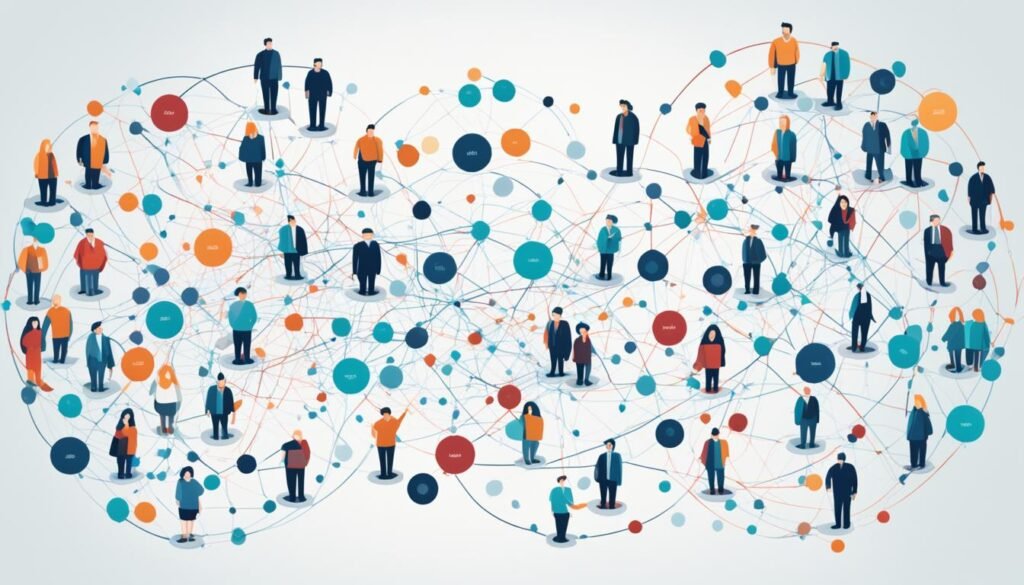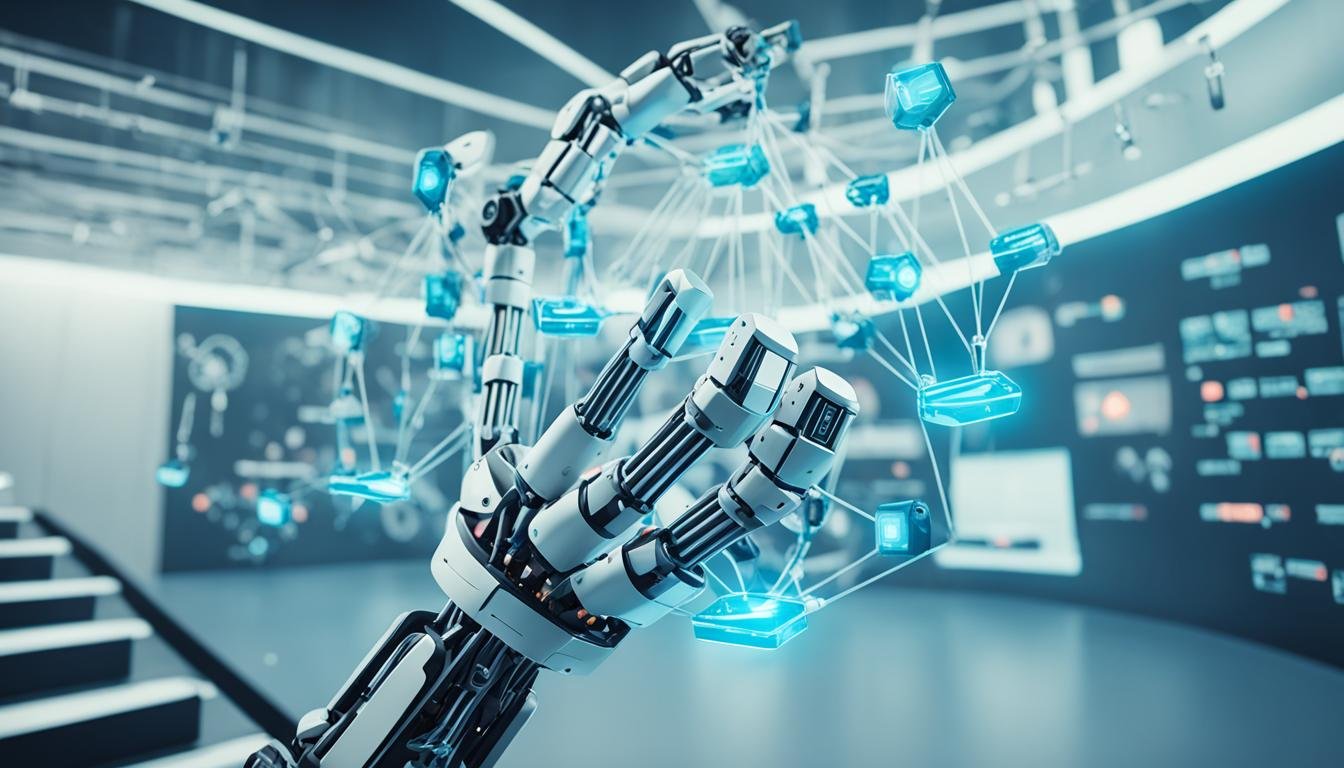AI is becoming more common in business, with about 77% of companies using it or checking it out. This technology can make things more efficient, cut costs, and boost productivity. But, we need to think about the Ethics of AI sides of using AI.
Businesses should make and use Ethics of AI in a way that respects values like fairness, privacy, and individual rights. They should also avoid manipulating things. This approach helps keep customers trusting them and moves AI forward in a good way.
Companies that focus on Ethics of AI set rules that are stricter than the law. This way, they make sure their AI doesn’t hurt anyone. Doing this helps them stay ahead in the market and keep customers coming back.
As AI becomes more widespread in business, it’s key for professionals to really get the ethical issues. We’ll look into bias and discrimination in AI, the need for clear and accountable AI, and how AI affects the workplace and society.
Table of Contents
Introduction to Ethics of AI in Business
AI is changing how businesses work, making business ethics more important. Ethics of AI means using AI in a way that respects values like fairness, privacy, and individual rights. It also means avoiding manipulation.
What is Ethics of AI and Why is it Important?
Companies that focus on Ethics of AI do more than just follow the law. They set their own rules to make sure AI doesn’t hurt anyone. They tackle problems like bias, privacy, and clear AI decision-making.
Getting a degree or certificate in AI can help professionals deal with ethical issues with artificial intelligence. Knowing about AI in business helps companies follow business ethics. This builds trust with customers and others.
“AI ethics became a mainstream breakthrough during 2023, as businesses recognized the need to ensure transparency in AI systems to build trust and identify biases.”
It’s important for businesses to be clear about who is responsible and to protect privacy. They should make AI easy for everyone to use. They should also make sure AI uses less energy.
Businesses need to keep learning about the latest in Ethics of AI. Following these rules helps them stay legal and ready for new laws.

By choosing Ethics of AI, companies can avoid problems with biased algorithms and privacy issues. This builds trust and helps them succeed in the fast-changing digital world.
Bias and Discrimination in AI Systems
AI systems can’t avoid the biases and prejudices in the data and processes used to make them. Over 50% of AI bias comes from biased assumptions during development or prejudices in the training data. This leads to AI showing racial, gender, disability, and age biases, which can discriminate.
There are many examples of AI bias. A tech giant’s AI hiring tool was biased against women. A social media platform’s algorithm preferred showing White faces over those of color. In one test, images of Black people were wrongly classified as not human more often than any other race.
The AI Index Report 2022 found that AI had trouble understanding Black speakers, especially Black men, more than White speakers.
When companies buy AI parts from others, it can make bias harder to check. Also, those making AI often don’t know enough about social science to spot bias. This is because they’re under pressure to get things working fast.
Teams making AI without diversity might miss bias. A team mostly of White men might not see how they’re biased against women of color. Not thinking about gender and race in AI development can lead to biased results if these issues aren’t addressed.
To fix these problems, it’s key to have strong AI rules and a focus on ethics. These should be backed up with steps to make sure AI is fair in what it does and how it treats data.
Transparency, Accountability, and the “Black Box” Problem
AI systems are now key in areas like healthcare, finance, and justice. But, their decision-making is often a mystery. This “black box” issue can lead to unfair hiring or wrong medical diagnoses. To fix this, experts are working on explainable AI (XAI) to make these systems clearer.
Explainable AI and Model Interpretability
It’s vital to make AI clear and accountable, especially when it makes mistakes. Knowing how AI decides can help fix problems. New methods are being made to make sure AI is fair and doesn’t have biases.
The European Union’s GDPR demands more openness from AI systems. It calls for clear explanations of how AI makes decisions. Getting feedback from users and experts can make AI more open and fair.
| Sector | Transparency and Accountability Challenges |
|---|---|
| Healthcare | Reluctance to adopt AI-based solutions due to lack of trust and accountability concerns, particularly in areas like medical diagnosis and cybersecurity |
| Finance | Difficulty in complying with regulatory standards when using opaque “black box” AI models, increasing the risk of biased decisions |
| Cybersecurity | Vulnerability to data poisoning threats due to the inability to understand and debug deep learning AI models, hindering effective response to cyber threats |
Fixing the “black box” issue and making AI explainable helps build trust. It ensures fairness and promotes responsible AI use that follows ethical rules and laws.

Ethics of AI
As AI technology gets better, it’s key for businesses to think about its ethical sides. Worldwide, businesses are spending $50 billion on AI this year and $110 billion by next. This makes AI a big deal in business today. But, it also raises big questions about fairness and bias in AI.
One big worry is AI making unfair or biased decisions. AI can reflect and boost the biases in the data it’s trained on. This means some people or groups might get treated unfairly. This is a big problem in areas like banking, where AI helps decide on loans.
Another concern is privacy and AI making detailed profiles on people. As AI gets smarter, there’s a risk of using it to trick or control people. We need everyone – tech experts, lawmakers, ethicists, and society – to work together. They must make sure AI is used right and fairly.
| Industry | Spending on AI (2022) |
|---|---|
| Retail | Over $5 billion |
| Banking | Over $5 billion |
| Media | Predicted to invest heavily (2018-2023) |
| Federal and Central Governments | Predicted to invest heavily (2018-2023) |
As AI use grows, businesses must focus on ethical AI practices. This means tackling bias, privacy, and being open. Working with experts and following responsible AI rules helps companies use AI well. This way, they make sure everyone is treated fairly.

AI’s ethical issues are tough and need a big effort from everyone. By choosing ethical AI, businesses can make the most of this new tech. They can do this while looking out for their customers and the wider community.
Mitigating Bias and Promoting Fairness
Artificial intelligence (AI) is changing many industries fast. It’s important to think about the ethical sides of this tech. We need to work on reducing bias and making AI fair.
Causal Models and Human Perceptions of Fairness
Researchers are looking into causal models to check if AI is fair. These models look at how inputs and outputs are linked. This helps us see if AI decisions match what we think is fair.
They found that a food delivery platform’s algorithm was more fair when seen through causal models. This shows how important fairness in AI is.
It’s key to make sure AI treats everyone fairly. To fix bias, we need to test a lot and have diverse teams. Developers should think about ethics and work to reduce bias for responsible AI use.
- AI can be biased from the start, leading to unfair results. For example, facial recognition works better on lighter skin, leaving out and misidentifying darker skin tones.
- To fight bias, we use diverse and representative data for training. This helps AI learn about different people.
- Techniques like re-sampling and re-weighting fix biased data. This makes sure AI models see everyone equally.
- We use fairness metrics to measure bias in AI. These metrics look at how AI affects different groups.
- Tools like the IBM AI Fairness 360 help find and fix biases in AI.
AI needs to be fair to avoid stereotypes and exclude certain groups. The AI world, policymakers, and ethicists are working together. They aim to set rules and best practices for ethical AI, focusing on reducing bias and promoting fairness.

“Promoting fairness in AI is essential to ensure the technology delivers equitable outcomes.”
AI, Automation, and the Future of Work
The fast growth of AI automation has made people worry about job displacement and its effect on the future of work. Some experts believe AI could create more jobs than it replaces if used wisely. It’s important to use AI automation in a way that helps workers and society.
Responsible Innovation and Workforce Transitions
To deal with job displacement, we need to act fast. This means offering training and policies to help workers adjust. It’s also key to have strong support systems in place to make sure AI technology helps everyone.
Researchers like Acemoglu and Johnson (2023) worry about AI’s impact on jobs and monitoring at work. They point out the danger of AI favoring a few investors and owners. They suggest we need a fairer economic future with AI technology.
To lessen the bad effects of AI automation, we must focus on responsible innovation. We need to manage workforce changes carefully to protect workers. This means working together between policymakers, businesses, and labor groups. They should create plans to help workers, support learning, and open new doors in the future of work.
| Impact of AI Automation | Opportunities | Challenges |
|---|---|---|
| Job displacement in certain industries | Creation of new categories of jobs, such as AI system trainers and maintenance specialists | Addressing worker displacement and increased inequality |
| Increased accuracy and safety in workplace operations | Growing demand for professionals in AI ethics, policy, and governance | Ensuring fair pay, safe working conditions, and formalized contracts for workers |
| Escalated need for professionals with expertise in data science, machine learning, and cybersecurity | Opportunities for workplace augmentation and increased human-AI collaboration | Maintaining the human element of work and complementing human labor with AI |
As AI automation changes the job world, we need to work together and lead with vision. This will help make sure these new technologies lead to a better future of work for everyone.
Conclusion
Dealing with AI’s ethical issues needs teamwork from tech experts, lawmakers, ethicists, and everyone in society. We must set strong rules, make AI systems clear, and work for everyone’s inclusion. This way, we can use AI’s great benefits while keeping it ethical. By facing these issues early, companies can make AI a key part of a better future.
AI has brought up many ethical questions, like bias and job changes, and risks to our existence. Experts like Vincent Müller and others have shared important thoughts. They show we need clear moral rules as AI takes on more human tasks.
As AI gets smarter, we must create rules that help society. We need to fight bias, keep AI open, and make sure it matches our values. By working together, we can make a future where AI makes our lives better. It will follow the rules of AI ethics, responsible AI, and ethical AI in business.



